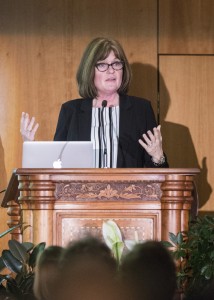Parents worried about constant teen text messaging can take heart; one researcher says a majority of teen texts contain neutral or positive messages.

Digital communications psychologist Marion K. Underwood addressed a BYU audience about adolescent digital interactions on Thursday, Feb. 11. She said teen texting isn’t nearly as negative as many parents fear, and she recommended that parents actively learn about their children’s social media usage.
Underwood’s findings about teen text messaging come from her longitudinal research. She began studying a sample of children when they were nine-years-old and gave each participant a smartphone at age 14. Underwood then spent four years analyzing her participants’ text messages and emails.
“We have to acknowledge that text messaging may provide important developmental opportunities for youth. They crave peer contact, and this is a way they can communicate closely with friends,” Underwood said. “We saw some of the most wonderful examples of adolescents using text messaging to engage in intimate, supportive behavior.”
Six percent of the text messages contained sexual themes and seven percent included profane language. However, a majority of the messages in the sample — 70 percent — contained positive or neutral messages.
Underwood also discussed her recent work analyzing 13-year-olds’ social media usage. She conducted this study with CNN, and the results suggest social media plays a bigger role in adolescents’ lives than their parents understand.
“Online experiences were vitally important to these students,” Underwood said. “When we asked them what was more important, their offline social experiences or their online experiences, they said online social experiences were more important in their lives.”

The research revealed that teenagers often look at social media platforms without posting or commenting on anything, a phenomenon known as “lurking.” Lurking and social media overuse can contribute to social comparison and make adolescents aware that their friends are excluding them, Underwood said.
“What seems to hurt children the most in the online social world is so subtle that even the most vigilant parent might not pick this up,” Underwood said. “What hurts them the most is very difficult for adults to see. In general, parents and children both reported that parents know very little about their children’s online lives.”
She recommended parents learn more by adding their children on social media and restricting phone usage. Parents can do this by establishing cellphone rules for car rides, family meals and nighttime, she said.
“Most of all, I think we need to talk with children about their online social lives,” Underwood said. “Our best hope of influencing their online conduct and online experience is to use our relationships to discuss with them.”
Underwood is the Dean of Graduate Studies at the University of Texas at Dallas. Her on-campus address was the 12th annual Marjorie Pay Hinckley Lecture, named for the late wife of Gordon B. Hinckley, 15th president of The Church of Jesus Christ of Latter-day Saints.




